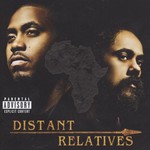Distant Relatives
Studio Album by Nas & Damian Marley released in 2010Distant Relatives review
Good music for good purposes
The Distant Relatives CD should be intriguing for the wide audience for two main reasons. The first one is the lineup of the duet that made it. It consists of Nas, an extremely popular rapper famous for his conceptual works and thoughtful texts; and Damien Marley who is so good at doing reggae. The two have an experience of working together both in the studio and on the stage. But this is the first time they are collaborating for such a big and serious project. The second reason is that the released album was made for the sake of charity. The funds to be raised from its selling are to be used in one of the humanitarian programs in an African country. Marley, who did the largest part of producing for this record, said about it repeatedly in a number of his interviews. Back in the nineties, the music form embracing reggae and hip-hop was widespread; but with the coming of the new century, the genres were put far asunder. This makes Distant Relatives even more attractive.
Distant Relatives: symbiosis of genres
Good hip-hop always means good lyrics, that type of lyrics that almost reaches the level of poetry. Nas, of course, can not claim the right to be called a genuine poet, yet this guy has learned for almost twenty years of being on the stage not just to rhyme lines, but to select the most proper words, create meaningful images and unique metaphors. Rappers have always tended to singing about hardships of this life, poverty, criminality, discrimination and many other bad things that plague our existence. Such bad things have always been more than average in Africa, and Africa is exactly the place that Distant Relatives is dedicated to. The remarkable moment is that the first tracks are more on the side of hip-hop, while as the record is getting to its final sound, the material gets more and more reggae influenced. As We Enter, and Tribes At War are so much like true hymns of life in NY ghettoes that is in so many details depicted not in separate songs, or even albums, but sometimes discographies. Instead, In His Own Words looks good for choir performing when you can raise your hands into the air or just clap them. The musicians avoid struggling for the leading part in this cooperation, and they do it well. While Marley takes up doing most difficult vocal bits, Nas delivers one powerful line after the other in that audacious and confident way that only true hip-hoppers master skillfully.
Close relatives
Although reggae and hip-hop were juxtaposed brilliantly on many occasions, Distant Relatives, in many terms, is a work that has no predecessors. It is not a rap album with elements of reggae, or visa versa. It is a project involving the labor of two grand performers whose main challenge is maintaining a balance, right, balance, between the two trends. However, it seems that the participation of Nas was more essential for this cooperation than that of Marley. And one of the main reasons is not that the former is more talented. Nas is simply more popular, as hip-hop is in greater demand than reggae. Besides, Nas is working hard to enhance the present hip-hop, and not just employing it to get prosperous in his own personal way. You now get a massive and complex experiment that attracted some other celebrities (Lil’ Wayne is one of them) and bears a political and sociological message. Musically, Distant Relatives proves the point that reggae and rap are true relatives and can live closely, at least, like good neighbors, or even share one roof.

